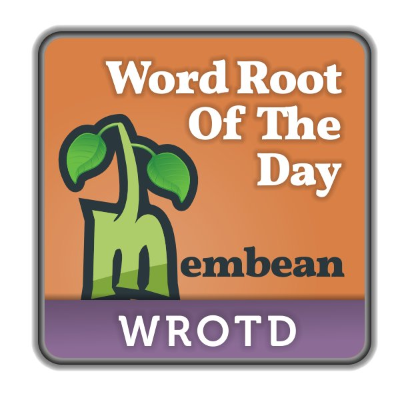
Membean Rootcasts
Englisch
Gratis en Podimo
Kostenlos hören bei Podimo
Starte jetzt und verbinde dich mit deinen Lieblingspodcaster*innen
- Vertraut von über 1 Mio. deutschen Hörer*innen
- Über 1.000 lokale Podcasts und Shows – nur bei Podimo
- Keine Zahlung nötig
Mehr Membean Rootcasts
Rootcasts are podcast episodes that teach you how word parts combine to create English vocabulary.
Alle Folgen
155 Folgen#155 Big Lig Ties
The Latin root *lig* and its variants *li* and *ly* mean "tie." This Latin root is the word origin of a good number of English vocabulary words, including [*lig*]ament, re[*li*]able and re[*ly*]. The root *lig* is easily recalled via the word ob[*lig*]ation, for an ob[*lig*]ation "ties" you to the doing of something.
#154 Be No Longer Separated from "Se-"
Prefixes are key morphemes in English vocabulary that begin words. A large number of English vocabulary words contain the prefix *se-*, which means "apart." Examples using this prefix include [*se*]parate, [*se*]cret and [*se*]lect. An easy way to remember that the prefix *se-* means "apart" is through the word [*se*]cure, for when you feel [*se*]cure you are "apart" from worrying or undue care about something potentially troubling.
#153 No Low Queue for Talking Now!
The Latin root *loqu* and its variant *locut* mean "speak." These roots are the word origins of a fair number of English vocabulary words, including e[*loqu*]ent, [*loqu*]acious, e[*locut*]ion, and circum[*locut*]ion. The roots *loqu* and *locut* are easily recalled through the words soli[*loqu*]y, or a "talking" by oneself, and inter[*locut*]or, or a person with whom you are "talking" or conversing.
#152 "Fort" Makes Your Vocabulary Strong!
The Latin root *fort* means "strong." This Latin root is the word origin of a large number of English vocabulary words, including ef[*fort*], com[*fort*], and [*fort*]e. The root *fort* is easily recalled via the word *fort*, for a "*fort*" is a "strong" building constructed so as to withstand enemy attack.
#151 Dissect Words with Sect!
The Latin root *sect* means "cut." This Latin root is the word origin of a good number of English vocabulary words, including in[*sect*], dis[*sect*], and inter[*sect*]. The root *sect* is easily recalled via the word [*sect*]ion, for a [*sect*]ion is a "cut"-off piece of a larger whole.















































